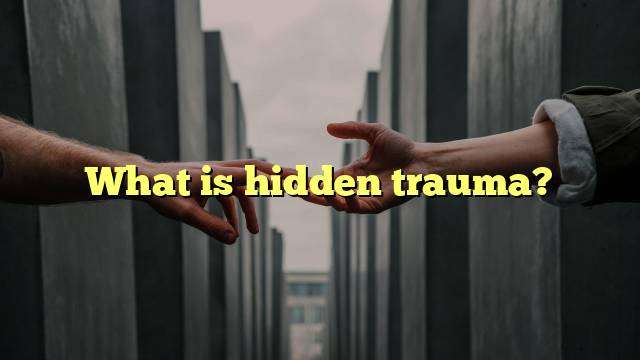What is Hidden Trauma?
Hidden trauma is a type of psychological and emotional distress that is not immediately apparent to the observer. It is often caused by a traumatic event or a series of events that have been experienced but not fully processed. This type of trauma can be difficult to identify and can cause depression, anxiety, or disturbances in daily life.
What Causes Hidden Trauma?
Hidden trauma can be caused by a variety of circumstances, ranging from a single event to a series of events that have left lasting psychological and emotional scars. Traumatic events can range from a physical assault to the death of a loved one, to a natural disaster, to long-term abuse or neglect.
In some cases, the cause of the trauma may not be immediately apparent, as the effects of the trauma may not have fully developed. This can make it difficult to make a connection between an event and a person’s behavior.
How Does Hidden Trauma Affect Us?
The effects of hidden trauma can vary depending on the individual and the circumstances of the trauma. Some of the potential psychological and emotional effects can include:
- Depression
- Anxiety
- Fear
- Anger
- Shame
- Guilt
- Post-Traumatic Stress Disorder (PTSD)
- Low self-esteem
- Social isolation
In addition to these psychological effects, hidden trauma can also have an impact on physical health. It can lead to headaches, insomnia, fatigue, digestive problems, and more.
How Can We Manage Hidden Trauma?
Managing hidden trauma requires a combination of self-care and professional help. It is important to create a supportive environment and to find ways to cope with the emotional and physical effects of the trauma.
Self-care techniques can include things like mindfulness, relaxation, and journaling. It is also important to prioritize self-care and to make time for activities that bring joy and relaxation.
In addition to self-care, it can be helpful to seek professional help. A therapist or counselor can help you to process the trauma and to cope with the psychological and emotional effects. They can also help to identify unhealthy coping mechanisms and provide guidance on how to better manage emotions.
Conclusion
Hidden trauma is a type of psychological and emotional distress that is not immediately apparent to the observer. It can be caused by a single event or a series of events and can have a profound impact on a person’s mental and physical health. Managing hidden trauma requires a combination of self-care and professional help. Self-care techniques can include mindfulness, relaxation, and journaling, while professional help can include therapy, counseling, and other support services. Ultimately, the goal is to create a supportive environment and to find healthy ways to cope with the effects of the trauma.



